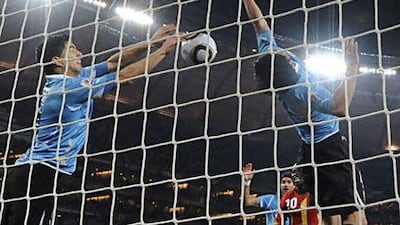Sitting in an eerily silent Soccer City Stadium after Luis Suarez's last-minute handball blocked Ghana's passage into the World Cup semi-finals on Friday night, it was hard to feel anything but sympathy for the Africans.
Forget that Asamoah Gyan, the Black Stars striker, struck the resultant penalty onto the crossbar and that Uruguay won the penalty shoot-out fair and square. The fact remains Suarez unfairly prevented a valid, match-winning goal. Fifa's Fair Play Code proclaims that "winning is without value if victory has been achieved unfairly", but there are three million people in a small South American country north of Argentina that would likely not agree.
Uruguay have reached the final four for the first time since 1970, and on the streets of Montevideo Suarez is being hailed a hero of similar standing to Alcides Ghiggia, the winger who scored his country's decisive goal in the 2-1 victory over Brazil in the final of the 1950 World Cup. "Long Live the hands of Luis Suarez" wrote El Pais newspaper yesterday. But while Suarez is, in contrast, being universally condemned outside his home country, the fine line between acting unfairly and cheating must not become blurred.
Diego Maradona in 1986 cheated, using, as he did, his hand to guide the ball into the net, deceiving the officials and helping to defeat England in the quarter-finals of the World Cup. Thierry Henry, the France forward, cheated last year when he used his arm to control a through-ball in a crucial qualifying match with the Republic of Ireland before passing to Wiliam Gallas to give Les Bleus a 2-1 aggregate win.
Suarez said "there was no alternative but for me to do that", but unlike Maradona and Henry, the Uruguayan did not cheat. He undoubtedly acted unsportingly and unmistakably acted immorally, but crucially he did not act deceitfully, save for a small protestation on sight of the red card. He was reprimanded for his handball - disgraced and dismissed - and his opponents were rewarded for the foul. That Gyan failed to capitalise from 12 yards makes it appear justice was not served, but the punishment, by law, fitted the crime.
Sadly, examples of deceit and dishonesty in football are more common than those of good gamesmanship; the beautiful game rarely works as quid pro quo. For every Morten Wieghorst, the Danish midfielder who deliberately missed a spot-kick against Iran in 2003 after an opposition defender picked the ball up on hearing a whistle he believed to be the referee's, there is a Sergio Busquets, a David Ngog and an Eduardo, who all cynically but successfully simulated fouls in major games last season to benefit their respective teams - Barcelona, Liverpool and Arsenal.
And while football is not the only sport where underhand tactics often prevail, it is certainly more common. In cricket, during a 1981 match between New Zealand and Australia, the Kiwis needed six runs to tie. Greg Chappell, the Aussie captain, ordered his bowler to perform underarm and was dutifully obeyed. The ball was rolled along the ground towards the wicket, rendering any chance of a six impossible.
"The most disgusting incident I can recall in the history of cricket," was how Rob Muldoon, the then-prime minister of New Zealand, described the scene. "It was an act of cowardice and I consider it appropriate that the Australian team were wearing yellow." Like Suarez though, Chappell had not ordered his side to do anything illegal. It was not cheating, it was bending the rules. And the rules have now changed.
"Good losers earn more respect than bad winners," Fifa's Fair Play code continues. But, regrettably, most sportsmen would rather have trophies, silverware and historical recognition than they would simply the respect of peers and public. Suarez is no different. It is the much-maligned Gyan who deserves the plaudits. To break an entire continent's hearts by missing a 120th-minute spot-kick and then step up first in the shoot-out and place your penalty in the very top corner is, in my eyes, worthy of worldly respect.
gmeenaghan@thenational.ae

